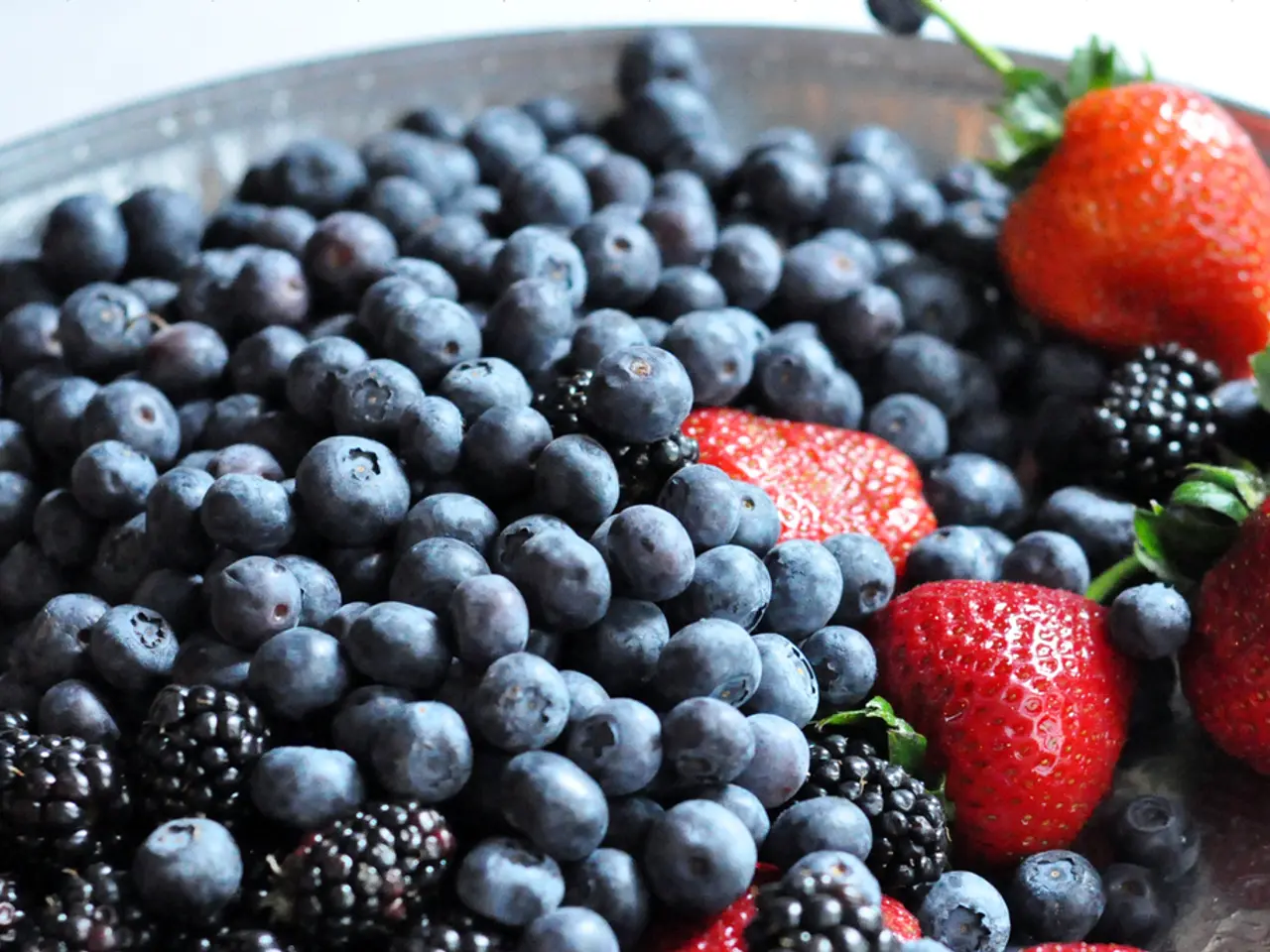Nutritional Perks of Blueberries: Exploring Their Health Advantages
Blueberries, with their deep purple-blue hue, have long been celebrated for their rich nutritional profile and numerous health benefits. Recent research has confirmed that these tiny fruits are indeed a nutritional powerhouse, offering powerful antioxidant and anti-inflammatory properties, as well as key vitamins and minerals.
One of the standout components in blueberries is their high antioxidant content, particularly anthocyanins. Wild blueberries, in particular, have been found to contain twice the antioxidants compared to regular blueberries[1]. These antioxidants neutralize free radicals, reducing oxidative stress and inflammation, which helps protect cells from damage linked to aging, neurological diseases, cardiovascular disease, cancer, and rheumatoid arthritis[1][3][4].
Blueberries are also rich in vitamins, contributing significantly to our daily intake. A cup of blueberries provides 24% of the recommended daily intake of vitamin C, 36% of vitamin K, 25% of manganese, and 14% of dietary fiber[2]. Vitamin C, for instance, boosts the immune system and fortifies other body functions[6].
The fiber content in blueberries is another significant advantage. Both total and soluble fiber are present, promoting digestive health[2]. Soluble fiber in blueberries binds with bile, aiding in its removal and reducing cholesterol levels[7]. While direct evidence on cholesterol is not extensive, the antioxidant and anti-inflammatory effects of anthocyanins are linked broadly to cardiovascular health, suggesting they may help improve cholesterol profiles[3].
Blueberries also show promise in managing blood sugar and blood pressure. Substituting blueberries for other fruits lowers sugar intake, potentially aiding blood sugar control[2]. The fiber content also supports better blood glucose regulation. Moreover, the anti-inflammatory properties may contribute to improved metabolic health and protection against insulin resistance[1][4].
Regular consumption of blueberries has been shown to reduce systolic blood pressure by about 5 mm Hg, improving blood vessel health and lowering hypertension risk[5]. Wild blueberries might offer even greater benefits due to their higher antioxidant content[5].
A 2020 study found that eating blueberries daily can lower certain cardiometabolic health parameters for men with Type 2 diabetes[8]. Organic frozen blueberries can be a cost-effective choice and can be used in various meals, such as cereal, oatmeal, smoothies, or salads. However, it's worth noting that antioxidants in blueberries can be damaged by heat, making raw, fresh blueberries the best choice for maximum benefits[9].
In conclusion, blueberries provide powerful antioxidant and anti-inflammatory benefits through flavonoids like anthocyanins, contribute key vitamins (C, E, K), increase dietary fiber, and have promising effects on reducing blood pressure and supporting heart and metabolic health, including potential improvements in cholesterol and blood sugar regulation[1][2][3][4][5].
References: [1] https://www.healthline.com/nutrition/10-proven-benefits-of-blueberries [2] https://www.health.harvard.edu/staying-healthy/blueberries [3] https://www.ncbi.nlm.nih.gov/pmc/articles/PMC5754212/ [4] https://www.ncbi.nlm.nih.gov/pmc/articles/PMC5561230/ [5] https://www.ncbi.nlm.nih.gov/pmc/articles/PMC3133035/ [6] https://www.healthline.com/nutrition/vitamin-c-benefits [7] https://www.healthline.com/nutrition/soluble-fiber-benefits [8] https://www.ncbi.nlm.nih.gov/pmc/articles/PMC7065744/ [9] https://www.healthline.com/nutrition/are-frozen-blueberries-as-healthy-as-fresh-ones#toc_title_hdr_1
Blueberries, rich in antioxidants like anthocyanins, contribute significantly to a health-and-wellness regimen by offering powerful anti-inflammatory properties and key vitamins such as vitamin C and K. Incorporating a healthy-diet that includes blueberries not only boosts the immune system but also has promising effects on blood pressure, cardiovascular health, and cholesterol and blood sugar regulation.







